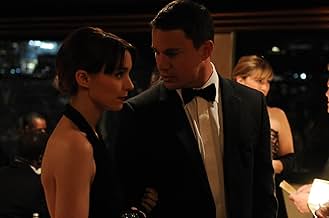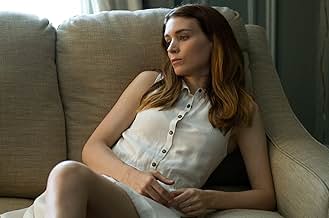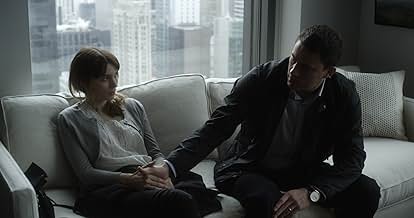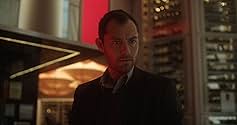Die Welt einer jungen Frau entwirrt sich, wenn ein von ihrem Psychiater verschriebenes Medikament unerwartete Nebenwirkungen hat.Die Welt einer jungen Frau entwirrt sich, wenn ein von ihrem Psychiater verschriebenes Medikament unerwartete Nebenwirkungen hat.Die Welt einer jungen Frau entwirrt sich, wenn ein von ihrem Psychiater verschriebenes Medikament unerwartete Nebenwirkungen hat.
- Auszeichnungen
- 5 Nominierungen insgesamt
Empfohlene Bewertungen
In our pharmaceutically inclined society, side effects are ever-present hazards of prescription drug usage. Whether they are minimized in print, or spoken in a hushed tone at the close of television commercials, side effects have become a shady companion of prescription drugs. Side Effects, Steven Soderbergh's alleged final film, focuses on the consequences visited upon a young couple after the side effects from the wife's medication cause her to commit an alarming act. As the chasm opens beneath this young woman, her psychiatrist struggles with his responsibility for her predicament, and confront his lingering suspicion about his patient's state of mind.
Ever the auteur, Soderbergh remains delightfully unpredictable with this latest feature. Side Effects initially presents itself as an indictment of the pharmaceutical industry, wearing its heavy-handed message on its sleeve, but promptly converts into a psychological suspense thriller. Soderbergh stares you directly in the eyes while he rips the rug from beneath your feet, sending you spiraling toward a conclusion that is equally unexpected and pleasing. Soderbergh and screenwriter Scott Z. Burns (Contagion, The Bourne Ultimatum) channel Hitchcock, creating an in-depth narrative that remains unpredictable until its final scene.
Soderbergh is known for generating a positive film environment for his cast, and maximizing the actors' potential in his films. Although the cast for Side Effects is comprised of actors who have previously provided impressive performances, each actor presents a character that rivals any prior roles. Rooney Mara plays the young woman at the epicenter of the conflict. Mara is extremely engrossing, creating an aura of discontent and depression within her situation. She acts as the film's catalyst, holding all the characters together while prompting them toward their conclusions. Attractive, graceful, and erratic, Mara is the wounded girl who isn't all that she seems.
While the film's driving force is Mara, Jude Law is its principle focus. As Mara's overwhelmed psychiatrist, Law provides his most empathetic role to date. Law establishes a flawed character who struggles with the consequences forced upon him, and transforms into a protagonist worthy of our admiration. Law and Mara provide such intriguing characterizations, Soderbergh seems to have difficulty deciding which to devote more time to. The scenes they share are the most arresting in this film.
There are few things more satisfying than a film which receives little attention, but creates an unexpectedly entertaining experience. Though Soderbergh has billed Side Effects as his swan song, he confirms that he is a cinematic mastermind in a film that would be an impressive conclusion to an eccentric career. Indulge in this unconventional thriller; you won't mind the side effects.
flickermotion.blogspot.com/
Ever the auteur, Soderbergh remains delightfully unpredictable with this latest feature. Side Effects initially presents itself as an indictment of the pharmaceutical industry, wearing its heavy-handed message on its sleeve, but promptly converts into a psychological suspense thriller. Soderbergh stares you directly in the eyes while he rips the rug from beneath your feet, sending you spiraling toward a conclusion that is equally unexpected and pleasing. Soderbergh and screenwriter Scott Z. Burns (Contagion, The Bourne Ultimatum) channel Hitchcock, creating an in-depth narrative that remains unpredictable until its final scene.
Soderbergh is known for generating a positive film environment for his cast, and maximizing the actors' potential in his films. Although the cast for Side Effects is comprised of actors who have previously provided impressive performances, each actor presents a character that rivals any prior roles. Rooney Mara plays the young woman at the epicenter of the conflict. Mara is extremely engrossing, creating an aura of discontent and depression within her situation. She acts as the film's catalyst, holding all the characters together while prompting them toward their conclusions. Attractive, graceful, and erratic, Mara is the wounded girl who isn't all that she seems.
While the film's driving force is Mara, Jude Law is its principle focus. As Mara's overwhelmed psychiatrist, Law provides his most empathetic role to date. Law establishes a flawed character who struggles with the consequences forced upon him, and transforms into a protagonist worthy of our admiration. Law and Mara provide such intriguing characterizations, Soderbergh seems to have difficulty deciding which to devote more time to. The scenes they share are the most arresting in this film.
There are few things more satisfying than a film which receives little attention, but creates an unexpectedly entertaining experience. Though Soderbergh has billed Side Effects as his swan song, he confirms that he is a cinematic mastermind in a film that would be an impressive conclusion to an eccentric career. Indulge in this unconventional thriller; you won't mind the side effects.
flickermotion.blogspot.com/
The poster of Side Effects features four famous faces on it: clockwise, you see Jude Law, Catherine Zeta-Jones, Rooney Mara, and Channing Tatum. There is a suggestion of a complex relationship between their characters - and of somewhat equal parts in the story. Both of those assumptions are proven false. Dr Jonathan Banks (played by Law) is gradually revealed as the protagonist of Side Effects, while his patient Emily Taylor (Mara) has a supporting, if most remarkable, role. Zeta-Jones plays the snake in the grass and spends most of the film out of sight, while Channing Tatum is briefly introduced as a handsome piece of furniture.
Side Effects has most in common with a Hitchcock thriller: Dr Banks faces a false accusation and must clear his name, with no support from his colleagues or from authorities. Characters are duplicitous and untrustworthy, and the question is not who is lying (everyone, everyone is lying), but how and why. Someone dies.
Rooney Mara delivers a great performance as a mentally unstable socialite - I whole-heartedly agree with Peter Bradshaw (The Guardian) praising her 'ability to be scared and scary at the same time'. As Mara's part is that of an unreliable narrator, it soon proves difficult to empathise with her character fully; instead, you spend a good while doubting her, yourself, and whether you are experiencing a déjà vu and whether you are experiencing a déjà vu.
There is no doubt that Side Effects is clever, yet, for me, the picture lacks in three important respects. The big questions about the use of mood-altering medication, experimental and otherwise, are raised, but then dropped as soon as the focus of the plot development shifts elsewhere. Two, the perilous and exciting romance - the supposed undercurrent of the narrative - feels shoehorned and staged. Finally, the ending brings us nearly full circle, and you are left wondering if the whole experience has had any effect on the protagonist.
Given that my original goal, when picking the film, was to see more praiseworthy acting by Zeta-Jones, I should find Side Effects satisfying. Unfortunately, as intelligent, ambitious, and well-acted as the film is, it lacks narrative cohesion and unity of tone, with the finale appearing as if a bow on a box.
Side Effects has most in common with a Hitchcock thriller: Dr Banks faces a false accusation and must clear his name, with no support from his colleagues or from authorities. Characters are duplicitous and untrustworthy, and the question is not who is lying (everyone, everyone is lying), but how and why. Someone dies.
Rooney Mara delivers a great performance as a mentally unstable socialite - I whole-heartedly agree with Peter Bradshaw (The Guardian) praising her 'ability to be scared and scary at the same time'. As Mara's part is that of an unreliable narrator, it soon proves difficult to empathise with her character fully; instead, you spend a good while doubting her, yourself, and whether you are experiencing a déjà vu and whether you are experiencing a déjà vu.
There is no doubt that Side Effects is clever, yet, for me, the picture lacks in three important respects. The big questions about the use of mood-altering medication, experimental and otherwise, are raised, but then dropped as soon as the focus of the plot development shifts elsewhere. Two, the perilous and exciting romance - the supposed undercurrent of the narrative - feels shoehorned and staged. Finally, the ending brings us nearly full circle, and you are left wondering if the whole experience has had any effect on the protagonist.
Given that my original goal, when picking the film, was to see more praiseworthy acting by Zeta-Jones, I should find Side Effects satisfying. Unfortunately, as intelligent, ambitious, and well-acted as the film is, it lacks narrative cohesion and unity of tone, with the finale appearing as if a bow on a box.
Steven Soderbergh has decided to end his career what can only be described as a pharmaceutical, psychosexual thriller that deals with several morally ambiguous characters all revolving around one horrible incident. Out of fear of giving away the intelligent, twist-filled plot written by Scot Z. Burns, that's really all I can say, although I can tell you that Soderbergh directs the film with extreme confidence, and it shows. He was able to convey a sort of quiet chaos with his frequent close-ups, and, by shifting in-and-out of focus throughout the screen, he was able to draw attention to the many small, yet important details.
The real strength of this film, though, is not necessarily the story itself, but how it is presented. To be honest, the story is almost too smart to the point of absurdity, but it never comes off as such. By releasing only one small piece of information at a time, we are kept waiting through interviews, court hearings, false trails, and many psychiatrist visits until, finally, everything comes together into one neat conclusion. The entire film is very subdued, but if you pay attention, you will be rewarded in the end.
Of course, the story would not have turned out so well without the multiple impressive performances that carry it all the way through. Rooney Mara is once again stunning as Emily Taylor, a woman who starts taking prescription antidepressants to cope with her husband's release from prison. Without giving much away, Emily is far more complex than she first appears, and Mara plays this perfectly by retaining a dark mysteriousness about her. She truly steals every scene she's in, and displays such a range of emotions that, at times, it's difficult to tell what her character is truly thinking. This is unfortunate for Channing Tatum, who does a fine job as her loving and sympathetic husband trying to make everything right after being released for insider trading, but who doesn't have close to enough material to compete with Mara.
Jude Law, on the other hand, is arguably the most central figure as Dr. Jonathan Banks, Emily's psychiatrist who is thrown into a scandal when his patient is involved in a tragic accident after taking an antidepressant he prescribed for her. He slowly mentally unravels as his decisions come back to haunt him, and eventually has to cross several moral boundaries in order to get his life back on track. Law shows this frustration with expert skill, and gives one of the best performances of his recent career. The same can be said for Catherine Zeta- Jones, who—as Emily's former psychiatrist Dr. Victoria Siebert—gives possibly the most complex performance, and does it brilliantly despite her lack of screen time.
To give away any more would be to say too much, as the film is so perfectly structured, it is difficult to discuss without giving away the whole thing. All I can add is, it is not so simple and straightforward as it may appear. It is a complex of characters, their motives, and the consequences of their actions, and, despite taking a while to get started, it is truly a spectacular, thrilling, and intricate journey that should not be missed.
The real strength of this film, though, is not necessarily the story itself, but how it is presented. To be honest, the story is almost too smart to the point of absurdity, but it never comes off as such. By releasing only one small piece of information at a time, we are kept waiting through interviews, court hearings, false trails, and many psychiatrist visits until, finally, everything comes together into one neat conclusion. The entire film is very subdued, but if you pay attention, you will be rewarded in the end.
Of course, the story would not have turned out so well without the multiple impressive performances that carry it all the way through. Rooney Mara is once again stunning as Emily Taylor, a woman who starts taking prescription antidepressants to cope with her husband's release from prison. Without giving much away, Emily is far more complex than she first appears, and Mara plays this perfectly by retaining a dark mysteriousness about her. She truly steals every scene she's in, and displays such a range of emotions that, at times, it's difficult to tell what her character is truly thinking. This is unfortunate for Channing Tatum, who does a fine job as her loving and sympathetic husband trying to make everything right after being released for insider trading, but who doesn't have close to enough material to compete with Mara.
Jude Law, on the other hand, is arguably the most central figure as Dr. Jonathan Banks, Emily's psychiatrist who is thrown into a scandal when his patient is involved in a tragic accident after taking an antidepressant he prescribed for her. He slowly mentally unravels as his decisions come back to haunt him, and eventually has to cross several moral boundaries in order to get his life back on track. Law shows this frustration with expert skill, and gives one of the best performances of his recent career. The same can be said for Catherine Zeta- Jones, who—as Emily's former psychiatrist Dr. Victoria Siebert—gives possibly the most complex performance, and does it brilliantly despite her lack of screen time.
To give away any more would be to say too much, as the film is so perfectly structured, it is difficult to discuss without giving away the whole thing. All I can add is, it is not so simple and straightforward as it may appear. It is a complex of characters, their motives, and the consequences of their actions, and, despite taking a while to get started, it is truly a spectacular, thrilling, and intricate journey that should not be missed.
I usually love Steven Soderbergh films. And this one starts off with his usual brilliance and had me hooked for the first half of the film.
The first of the film is well-acted, well-crafted, smart and involving.
Then comes the crunch: without spoiling, the second half of the film is quite different. In a sense the "smart" of the film just becomes an exercise in how "clever" the plot can be at the expense of any emotional truth to the characters. I stopped caring for the ensemble as they started to feel like lifeless pawns following the whims of a "how clever am I?" plot-line. You'll enjoy it if you like a Sunday Afternoon TV Detective movie and like solving the puzzle, but this is not great theatre.
It is better than most films, but only just. Certainly one of Soderbergh's most disappointing. Rooney Mara makes it still watchable - an actress to keep following.
The first of the film is well-acted, well-crafted, smart and involving.
Then comes the crunch: without spoiling, the second half of the film is quite different. In a sense the "smart" of the film just becomes an exercise in how "clever" the plot can be at the expense of any emotional truth to the characters. I stopped caring for the ensemble as they started to feel like lifeless pawns following the whims of a "how clever am I?" plot-line. You'll enjoy it if you like a Sunday Afternoon TV Detective movie and like solving the puzzle, but this is not great theatre.
It is better than most films, but only just. Certainly one of Soderbergh's most disappointing. Rooney Mara makes it still watchable - an actress to keep following.
Steven Soderbergh is a chameleon of a director and one of the few who has the ability to move from critically acclaimed Hollywood blockbusters, like Ocean's Eleven, to dramatic art films like The Limey. He is also one of the hardest working filmmakers today, taking on such roles as producer, writer, director, cinematographer and editor. As a director, he has been able to pump out two feature length films in a single year and he has done this more than just once. However, over the last decade his films have become weaker as it seems as though not enough time has been invested into exploring the emotional depths of the stories he is bringing to life. Therefore they lack the ability to conjure genuine emotion from their audience. It almost seems as if he does not care about whether or not audiences are moved or entertained, but rather is just doing his job, moving from one project to the next.
At the beginning of the year it was announced that Soderbergh was retiring as a director and that SIDE EFFECTS would be his last theatrical film release. In an interview with New York Magazine, he stated: "The worst development in filmmaking—particularly in the last five years—is how badly directors are treated. It's become absolutely horrible the way the people with the money decide they can fart in the kitchen, to put it bluntly."
Rooney Mara plays Emily, a woman who seems to be suffering from some sort of mental disorder after her husband, Martin, played by Channing Tatum, returns home from prison. After a failed suicide attempt Emily is introduced to Dr. Jonathan Banks, played by Jude Law, a psychiatrist who tries to help her by prescribing her an anti-depressant. As Emily's symptoms worsen, her psychiatrist and her try to find an anti-depressant that works for her. After many failed attempts Dr. Banks takes the advice of Emily's previous doctor, played by Catherine Zeta-Jones, and prescribes her a new experimental medication called Ablixa. The side effects attempt to destroy both of their lives.
Side Effects is shot and paced like a serious, well-crafted art film studying the truth behind depression which slowly builds into one hell of a tense thriller. What hold the film back is the ending. By the end this serious, well-crafted art film has succumb to a Hollywood twist gimmick popcorn flick better suited for the late 90's. I couldn't help thinking that someone had farted in the kitchen. I do not know if Soderbergh was just following the screenplay or if he was told to give it a happy ending that over-explains everything, leaving no sense of mystery and easily spotted plot-holes.
Of course, even with the out-of-place, poorly written surprise conclusion, Side Effects is still better than the majority of thrillers being produced today. And though it disappoints, the ride up until that point was mesmerizing and thought-provoking.
At the beginning of the year it was announced that Soderbergh was retiring as a director and that SIDE EFFECTS would be his last theatrical film release. In an interview with New York Magazine, he stated: "The worst development in filmmaking—particularly in the last five years—is how badly directors are treated. It's become absolutely horrible the way the people with the money decide they can fart in the kitchen, to put it bluntly."
Rooney Mara plays Emily, a woman who seems to be suffering from some sort of mental disorder after her husband, Martin, played by Channing Tatum, returns home from prison. After a failed suicide attempt Emily is introduced to Dr. Jonathan Banks, played by Jude Law, a psychiatrist who tries to help her by prescribing her an anti-depressant. As Emily's symptoms worsen, her psychiatrist and her try to find an anti-depressant that works for her. After many failed attempts Dr. Banks takes the advice of Emily's previous doctor, played by Catherine Zeta-Jones, and prescribes her a new experimental medication called Ablixa. The side effects attempt to destroy both of their lives.
Side Effects is shot and paced like a serious, well-crafted art film studying the truth behind depression which slowly builds into one hell of a tense thriller. What hold the film back is the ending. By the end this serious, well-crafted art film has succumb to a Hollywood twist gimmick popcorn flick better suited for the late 90's. I couldn't help thinking that someone had farted in the kitchen. I do not know if Soderbergh was just following the screenplay or if he was told to give it a happy ending that over-explains everything, leaving no sense of mystery and easily spotted plot-holes.
Of course, even with the out-of-place, poorly written surprise conclusion, Side Effects is still better than the majority of thrillers being produced today. And though it disappoints, the ride up until that point was mesmerizing and thought-provoking.
Wusstest du schon
- WissenswertesBlake Lively was originally cast in the lead role but the production company that was funding the movie dropped out after learning of her casting only to return after Rooney Mara took over the role from Lively.
- PatzerDr. Banks would never have been allowed to be an expert witness in a case in which he was the defendant's psychiatrist. This would present a blatant conflict of interest. He could only be a fact witness.
- Zitate
Dr. Jonathan Banks: Depression is an inability to construct a future.
- VerbindungenFeatured in The Tonight Show with Jay Leno: Folge #21.81 (2013)
- SoundtracksThe Forgotten People
Performed by Thievery Corporation
Written by Rob Garza (as Robert Garza) and Eric Hilton
Courtesy of ESL Music
Top-Auswahl
Melde dich zum Bewerten an und greife auf die Watchlist für personalisierte Empfehlungen zu.
Details
- Erscheinungsdatum
- Herkunftsland
- Offizielle Standorte
- Sprachen
- Auch bekannt als
- Terapia de riesgo
- Drehorte
- Produktionsfirmen
- Weitere beteiligte Unternehmen bei IMDbPro anzeigen
Box Office
- Budget
- 30.000.000 $ (geschätzt)
- Bruttoertrag in den USA und Kanada
- 32.172.757 $
- Eröffnungswochenende in den USA und in Kanada
- 9.303.145 $
- 10. Feb. 2013
- Weltweiter Bruttoertrag
- 63.414.135 $
- Laufzeit1 Stunde 46 Minuten
- Farbe
- Sound-Mix
- Seitenverhältnis
- 1.85 : 1
Zu dieser Seite beitragen
Bearbeitung vorschlagen oder fehlenden Inhalt hinzufügen








































